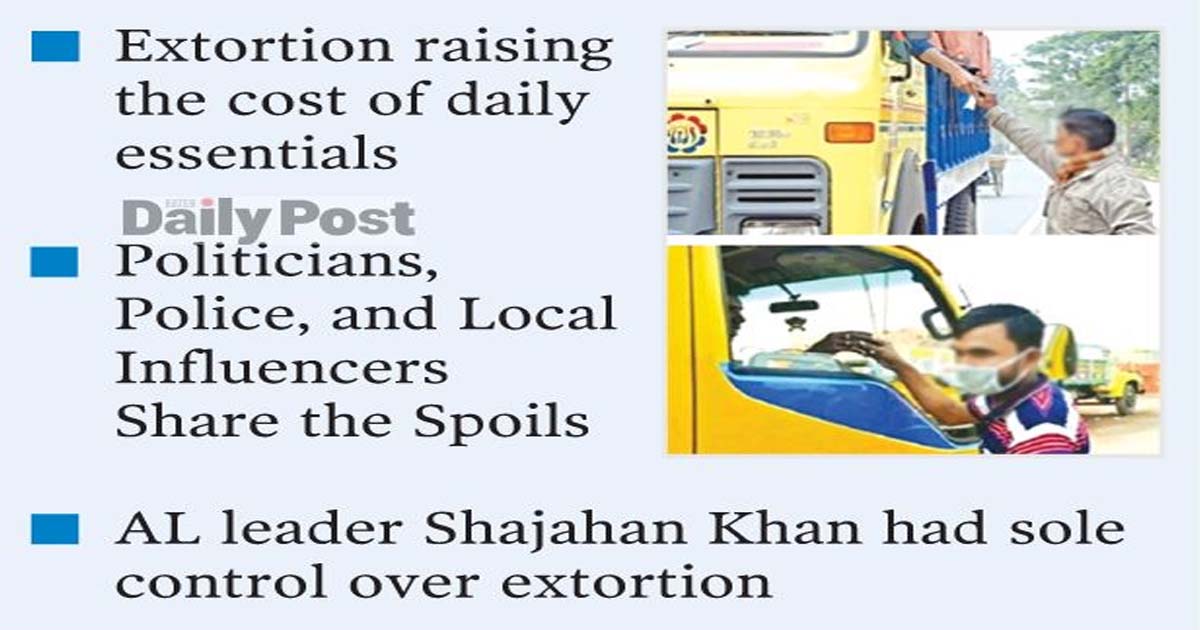Extortion on the country’s highways has become a multi-billion-dollar operation, with annual collections reaching over Tk 1,500 crore (approximately Tk 1.5 billion ), primarily lining the pockets of politicians, police officers, and local influencers.
The money is collected under the guise of "operation costs" by so-called workers' unions, with the impact being felt in the rising prices of essential goods across the country.
The largest vegetable market in the country, located in Barinagar Bazar, Jashore, has become a central point for extortion. A vegetable-laden truck traveling 200 kilometers along the highway must pay Tk 50 at each of at least seven points along the route, including areas like Narail, Kashiani, Mukshidpur, Bhanga, and Jatrabari, among others. This leads to a total of Tk 350 in extortion fees per truck.
The money raised through these extortion schemes is meant to cover the "operational costs" of workers' organizations, but investigations reveal that the funds are instead being siphoned off by local politicians, law enforcement, and powerful figures in the community. According to sources within the workers’ unions, this extortion operation is causing a significant rise in the cost of daily essentials, with the price of vegetables and other goods climbing sharply.
According to workers' union records, following the Awami League government’s second term in office, Shahjahan Khan gained sole control over the labor unions. Within a short period, he became the president of the labor federation, appointing Osman Ali and Moklesur Rahman as the general secretary and joint general secretary, respectively. In September 2020, Khan introduced a directive that imposed a Tk 50 fee per vehicle for "union welfare and operational expenses." The practice continues to this day.
To collect these extortion fees, the labor federation has set up 249 basic unions nationwide, which primarily operate under the name of district labor unions. These unions have been extorting Tk 50 from every vehicle that travels on the highways. From September 10, 2020, to July 31, 2024, a total of Tk 6,094 crore has been collected, which amounts to over Tk 1,500 crore annually.
Labor unions have filed complaints with both the police and the Anti-Corruption Commission (ACC) against Shahjahan Khan, alleging that he has misappropriated the extorted money. One such complaint came from the Dhaka Auto Rickshaw Workers Union, which represents 324,413 auto-rickshaws nationwide. Each of these vehicles is charged Tk 50 per day, amounting to over Tk 1.6 crore per day in extortion fees alone from auto-rickshaws.
Similarly, buses, cargo vans, covered vans, human haulers, and trucks across the country are also subject to this systematic extortion, which has continued despite explicit prohibitions in the Road Transport Act. The Act’s Section 38 clearly states that no money can be illegally collected from vehicles at terminals or while traveling on highways.
The extortion racket is not just a matter of labor unions but has deep political and institutional roots. Mohammad Hanif Khokon, general secretary of the Dhaka Auto Rickshaw Workers Union, claims that Shahjahan Khan, through his associates, issued orders that led to nationwide extortion. "The money collected is not being used for the welfare of the workers or the operational expenses of the unions; it’s being pocketed by Shahjahan Khan and shared among politicians, police officers, and influential local figures," he said.
Khokon added that despite numerous attempts to seek intervention from the former Minister of Road Transport and Bridges, Obaidul Quader, and the former Home Minister, Asaduzzaman Khan Kamal, no action was taken, as they were reportedly receiving their share of the extortion money.
The scale of the operation is staggering. According to workers’ union estimates, around 900 buses across 37 districts operate through the Gabtoli terminal in Dhaka. These buses, along with hundreds of other vehicles operating on routes like Dhaka-Paturia, are all forced to pay extortion fees. Even vehicles that do not use the terminal are coerced into paying up. Extortion is also rampant around the Shah Ali shrine in Mirpur, where over 200 vegetable trucks come daily, all of which must pay extortion fees ranging from Tk 500 to 1,000, depending on the type of vehicle.
In total, these operations are bringing in millions of Taka in extortion money every month. Although many of the identified extortionists fled after being exposed in early August, the practice continues unabated, with new individuals taking their place.
The influence of the late Aslamul Haque, former MP from Mirpur, Dhaka-14, still looms large in the extortion activities centered around the Gabtoli terminal. His brother, Mofizul Haque Bebu, played a key role in controlling the terminal even after Aslamul Haque died in 2021. Bebu, though having no personal transport business, maintained significant power within the Workers’ Federation and the transport owners’ association.
Following the death of Aslamul Haque, Bebu continued to run the extortion operation through political connections. The new MP for Dhaka-14, Mainul Hossain Khan Nikhil, has now taken over as the primary controller of the Gabtoli terminal.
In response to the growing concerns, police authorities have stated that they are taking a tough stance against extortion and are making efforts to control the rising prices of essential goods. Police officials have confirmed that instructions have been given to officers to take action against any form of extortion, and the police are acting on information from the public to root out these criminal activities.
Police spokesperson Inamul Haque Sagar said, "We have given special instructions to police personnel to crack down on extortion and robbery along roads and highways. Wherever we receive reports of such activities, we are taking strict action. Our goal is to prevent any form of terrorism or illegal activity in the transport sector."






